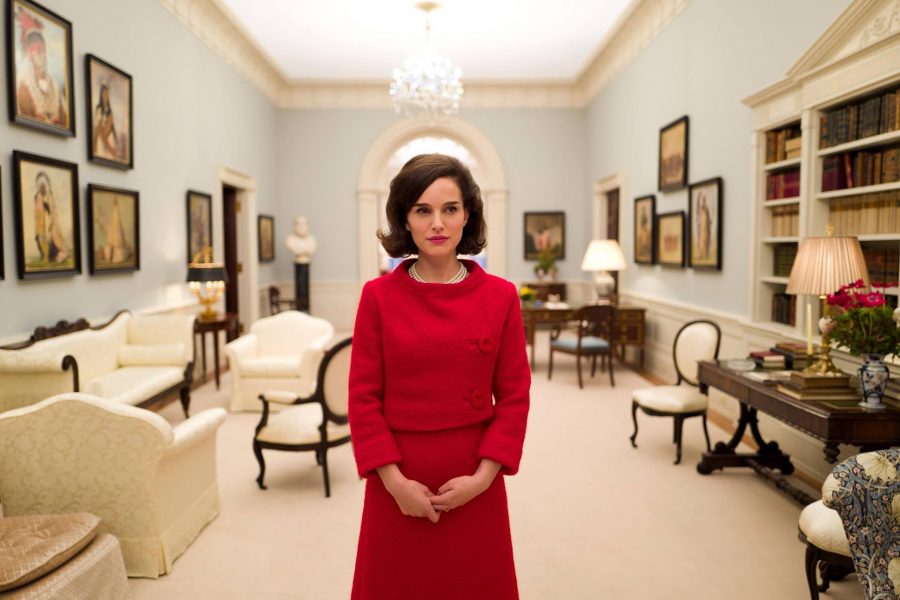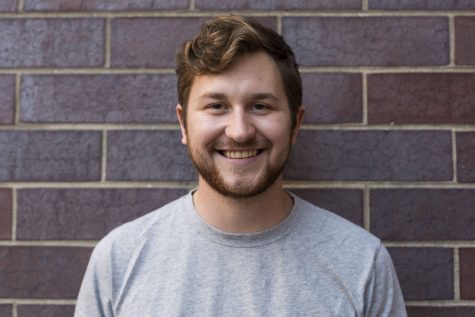Who Lives, Who Dies, Who Tells JFK’s Story
Natalie Portman portrays First Lady Jackie Kennedy, in Jackie.
December 7, 2016
From the opening shot of “Jackie” — an uncomfortably framed close-up of Jackie Kennedy as she walks across the lawn of her family’s estate — it’s clear that this film is not your typical laudatory biopic. Instead, Chilean director Pablo Larrain’s English-language debut creates an impressionistic, experimental portrait that challenges conventional understanding of the Kennedy legacy while still exploring the mythology of the dynastic family. This stylistic approach makes “Jackie” a better comparison to “The Tree of Life” than to “The King’s Speech.”
The film centers on Jackie Kennedy (Natalie Portman) during the week immediately following the assassination of her husband, former President John F. Kennedy, in Dallas, Texas. The film explores the harrowing week in nonlinear chronology, jumping back and forth in time using various framing devices. The most notable example comes during an interview conducted between Jackie Kennedy and Theodore H. White, a LIFE magazine journalist, at the end of the week.
The film also continually returns to conversations between Jackie Kennedy and a priest that took place during the funeral planning as well as a televised tour of the White House that was conducted by Kennedy before his assassination. While the jumping in time between these points — plus the actual assassination and its aftermath — may seem sporadic and messy at first, there’s a careful fluidity that emerges in these montages.
The First Lady’s emotions and ruminations on her life become more important than the sequence of events themselves. The stunning score supplied by Mica Levi beautifully relates “Jackie’s” internal structure to the audience. Her compositions have more in common with her score for the disturbing 2013 sci-fi film “Under the Skin” than to the music of any biopic of a similar subject matter. The effect is eerie and unnerving, which adds to the jarring style of the film’s cinematography and editing.
“Jackie” will certainly get the most praise for Portman’s commanding lead performance, and rightfully so. Portman captures Kennedy’s breathy voice and mannerisms perfectly — but her portrayal is more than an impression. This script calls for a spectrum of volatile emotions and Portman pulls it off at both ends. Her portrayal of Jackie Kennedy’s relentless terror after the shots are fired, as well as her cold and calculating conduct during the interview with White, is simply flawless.
That calculation on Kennedy’s part is, by and large, the main thesis of the film. Kennedy becomes obsessed with shaping her husband’s legacy. Amidst the chaos of the assassination’s aftermath and her own intense grief, she labors to craft the image of the kind of president her husband was and how he should be remembered. She even models his funeral procession after that of Abraham Lincoln because she wants the two men to be mentioned in the same breath.
This representation of Kennedy’s analytical and circumspect personality may come across as cold to some viewers. In fact, she largely remains an enigma and a mystery. But Larrain does not seem interested distilling or watering down her mystique. Rather, he chooses to explore how the myths of our cultural icons are formed and spread. “Jackie” is an ambitious, unconventional undertaking that is an unforgettable experience and one of the best films of the year.
“Jackie” was released in national theaters on Dec. 2.
Email Zach Martin at [email protected].


























































































































































Paul Henry • Dec 7, 2016 at 10:45 pm
If the Kennedy’s were not killed in a home state conspiracy like the one suspected of making George W. Bush the next President in the political home state of his brother, the Governor of Florida, Governor Jeb Bush, then why out of 50 states, if Obama hadn’t won all three of the Kennedy’s, John, Robert and Ted would have died in the home state of the next President?